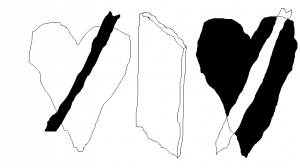Blog Post 6, Complaint and Answer
What determines that Allah is in favor of one’s worship? To the early caliphs of Islam, from whom arose the authority figures of Sunni Islam, territorial expansion, remarkable constructions, etc., were evidences of Allah’s favor toward them. To the Shi’a Muslims, whose history has been characterized by martyrdom and political defeat, oppression, suffering, and martyrdom can be evidences of Allah’s favor of their worship. Muhammad Iqbal’s poem, Complaint and Answer, begins with the poet’s complaint that Allah has forsaken Muslims and favored non-Muslims by giving these non-Muslims economic, social, and political successes. Further, the poet complains that this disfavor from Allah has come on the back of remarkable Muslim piety and devotion. The leftmost heart in my painting captures the poet’s complaint by depicting a white heart – symbolic of true and remarkable Muslim piety – pierced with a black arrow – symbolic of disfavor from Allah.
Such complaint from the mortal poet may easily be seen as disrespect toward an immortal God; but, interestingly, God responds without punishing the poet and acknowledges that the use of poetry to complain was a welcome gesture. This is reflective of poetry’s role in Islamic devotion. God’s response turned the earlier complaint on its own head, with God reminding the Muslims that their hearts are neither pure nor white, and that it’s the devotion of their forefathers that they claim in suggesting that they have lived in submission to Allah. I depict this view of the Muslims’ heart by Allah as the black heart on the right side of the painting. The white arrow piercing the black heart shows that indeed, from Allah’s perspective, it is fair that Allah forsakes the disloyal Muslims. Between the two hearts in the painting is a mirror to show that the complainant and the respondent are both looking at the same heart; yet, they arrive at different views of the condition of the heart.
Explore posts in the same categories: Uncategorized